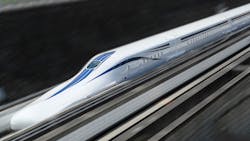Baltimore-Washington SCMaglev project DEIS published
The Draft Environmental Impact Statement (DEIS) for the Baltimore-Washington Superconducting Maglev (SCMAGLEV) Project was published Jan. 15, marking a step forward in the environmental review process for the private-sector project.
The comment period for the DEIS opens Jan. 22 and the Federal Railroad Administration (FRA) extended the period to 90 days from 45 following requests from stakeholders.
The Baltimore-Washington SCMAGLEV is a private-sector project being proposed by Baltimore-Washington Rapid Rail (BWRR). FRA and the Maryland Department of Transportation Maryland Transit Administration (MDOT MTA) prepared a DEIS to study the potential environmental impacts of a new high-speed rail system. BWRR’s proposed SCMAGLEV system would operate between Washington, D.C., and Baltimore with a stop at Baltimore/Washington International Thurgood Marshall Airport.
On behalf of BWRR, MDOT’s responsibilities, in partnership with FRA, include: administering the federal grant funding to perform preliminary engineering and the National Environmental Policy Act (NEPA) study; preparing NEPA documentation; and managing the DEIS public outreach process.
"We are thrilled to have reached this critical milestone in our effort to bring the world’s fastest train – the Superconducting Maglev (SCMaglev) – to the Baltimore-Washington region. The release of the Draft Environmental Impact Statement is a significant accomplishment for the entire state of Maryland led by the Federal Railroad Administration, the Maryland Department of Transportation and more than 30 federal, state and local agencies that have collaborated for years to conduct this detailed study, including input from over 200 public meetings,” said BWRR Chairman and CEO Wayne Rogers. “Our team at the Northeast Maglev is excited to dig into the results and begin the process of ensuring any issues identified within the draft, or raised during the public comment period, are addressed in the best way possible for communities and the environment. We remain committed to ensuring the Northeast Maglev is constructed and operated in a way that allows all local residents to share in the economic, educational, environmental and social benefits associated with this next-generation transportation system.”
The 90-day comment period is open until April 22 and virtual public hearings, organized by FRA and MDOT MTA, will be held after March 22.
The DEIS is available at www.bwmaglev.info.




